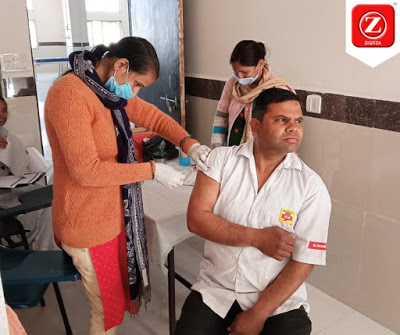The year 2020 was unquestionably momentous and tragic. Climate crisis, natural disasters, political upheavals and human rights abuses confronted humanity with unprecedented challenges but nothing impacted the world like the novel coronavirus disease (COVID-19) pandemic did.
We began 2021 with the pandemic still ravaging populations around the globe. In the middle of the catastrophe, with the importance of testing finally acknowledged and vaccines becoming available in many countries, there is hope that the disease may be brought under control. Researchers are still struggling to fit and to understand the coronavirus, but that’s how science works.
Now COVID-free future is within our reach – a future where it’s safe to hug again and where our smiles no longer need to be hidden behind a mask. To get there, we will need a robust vaccination drive. We will need Indians to roll up their sleeves and get vaccinated but we will also need to be patient. Immunizing the country won’t happen overnight. It will be an incremental process informed by science and one that seeks to immediately stem the loss of life. Convincing people to take the vaccine is an immediate concern—it’s key to ending the pandemic. Earlier this month, the Government encouraged all health care workers, all essential workers, and the general public to receive the vaccine when they become eligible. In India we started its vaccination programme on January 16, 2021, with this India is at the fourth spot in the list of countries with a maximum number of COVID-19 does administered. So far supplied COVID -19 vaccines to 15 countries and another 25 nations are in the queue at different levels. There were multiple reports on vaccine-related hesitancy among health workers. Where many healthcare workers have either failed to turn up or refused to get vaccinated in the first week of the pan-India drive. This is due to reasons such as glitches in the CoWin app, apprehensions about Covaxin in the absence of stage 3 trial data and general concerns over side-effects which are expected in the initial stages of the programme. But compared to other countries, Indians are among the most trusting when it comes to Covid-19 vaccines, according to the latest survey.
Ziqitza Rajasthan 108 Ambulance Driver says “The science and research behind Covid vaccine may save my life that’s because I’m about to get my COVID-19 vaccine. I have the fortune of becoming an early recipient, but only because I belong to a vulnerable group being a frontline worker helping save lives in Pandemic”. Ziqitza also urged governments across India to speed up the rollout of the vaccine, especially to those most likely to experience severe illness, such as seniors, Indigenous people and radicalized people – all of whom have been shown to be most at risk of infection.
Apart from this what’s also been lacking in vaccine delivery program is evidence-based information. Within this vacuum, misinformation, vaccine myths, and mistrust have thrived. Sadly, many people are hesitant to get vaccinated, particularly among marginalized communities who, we recognize, have all too often experienced negative interactions with the medical community. We at Ziqitza Healthcare ltd encourage all to receive the vaccine as soon as they are available. Our frontline healthcare warriors across India have served the people in need irrespective of thinking about their lives and safety. They truly deserve to get vaccinated first as they still have a long way to go and help people suffering from COVID – 19. Together, we all can contain this virus, end the pandemic, and participate in India’s post-pandemic recovery. We believe that any risk posed by the vaccine is far outweighed by the benefits of being protected from COVID-19. As with any other medical treatment, informed consent is required. Everyone who gets the vaccine must understand the benefits of immunization, as well as any potential risks. All should be empowered to make an informed decision. We also know that historically, immunization programs have saved countless lives worldwide. The COVID-19 vaccines approved thus far have the potential to provide much-needed protection against the continued spread of the SARS-CoV-2 virus, but this will only happen if sufficient numbers choose to be vaccinated.


